- Home
- David Adams
Lacuna: The Prelude to Eternity Page 3
Lacuna: The Prelude to Eternity Read online
Page 3
She gritted her teeth. This was too much, too quickly. Her mind was still clouded by waking up, by so much news all at once. “Can we slow down a bit? I know you’ve been planning this for some time, but it doesn’t seem right to me. This is… this is a lot to take in.”
“Of course, of course.” Saeed didn’t push the subject. “We might consult with the Kel-Voran once you’re out and the prosthetic has been manufactured. They might have some advice for us.”
That was news to her. “There are Kel-Voran on Velsharn?”
“There have been for some time, ever since the battle. Their sensors detected a number of escape pods from the ruined stern of the Seth’arak. They’ve been hard to find because of the debris. We recovered some pods, an interesting fact we didn’t exactly share with our allies. The Kel-Voran want to find them and execute the Toralii inside. We, however, want to keep them alive for their intel. We’ve scoured most of the debris fields, but it’s slow going. The pods are engineered to blend in with debris unless inspected by Toralii rescue vessels, probably due to their various enemies taking the time to hunt them down.”
The Toralii and the Kel-Voran had been at loggerheads for centuries. Warfare on Earth had been shaped by the tactics of the belligerent opponents. Advances in antitank weaponry drove development into harder armour or active countermeasures…
No. She had to stop her mind wandering.
“Go on,” Liao said.
“Personally,” said Saeed, “I suspect the rest have landed—or will shortly land—in one of the nearby island chains. We’re organising a search of the area thoroughly with flyovers and thermal observation from orbit. We haven’t found much yet.” He shook his head. “Try telling that to the Kel-Voran, though. I think they suspect as we do. They want to search the islands by hand, but Captain Anderson is of the opinion—an opinion backed up by our Telvan contacts—that the Kel-Voran ‘search’ will be intensely destructive. Apparently, it’s more of a reconnaissance in force—specifically, by carpet bombing and inspecting the remains.”
That couldn’t be allowed to happen. “This planet is our home now. We need those islands when the time inevitably comes for us to expand.”
Saeed nodded. “Captain Anderson said the same thing.” The mention of his name seemed to jog some memory. He smiled and reached for a manila envelope, slightly faded and covered in a thin layer of dust. “Speaking of the good captain, he left these here for when you woke up.” He upended the folder into his hand—two pips. “It seemed inappropriate for the CO of the flagship to be a lowly commander. Congratulations, Captain Liao.”
Captain in rank but no longer in position. She didn’t feel as though she had earned it. She had made too many mistakes, her crew had suffered, her ship broken beyond repair and regulated to functioning as a small city embedded in a sea of tents, demountables, and temporary structures.
Instead of the culmination of a lifetime career, the promotion left her bitter. If the prosthetic could not restore full functionality, she could no longer command the Beijing, not that the ship was in any condition to be commanded. Even if they repaired the hole in the hull, as Saeed said they were doing, the Beijing bore too many scars of too many engagements: patch jobs and rushed repairs or damage simply ignored as it was not in critical systems.
Her ship had been chipped apart, worn down to exhaustion, then smashed with a hammer from orbit.
“Thank you,” she managed. “Pass along my thanks.”
Saeed hesitated a moment, as though he could sense something of her true feelings, but was wise enough to gently pour the pips back into the envelope and refold the top. “I will, next time I see him.” He smiled again, folding his arms.
“Thank you, Doctor. One more question.” She hesitated. “What is Scarecrow?”
His reluctance confused her. “Maybe it’s time for rest,” he said. “You’ve had a busy day.”
The truth was she was exhausted. Keeping her eyes open was a trial. “I want to see Allison,” she said, fighting the urge to sleep. Her daughter was the most important of all, but there were others. “And James. Saara. Kamal. I want to see everyone.”
“I’ll draw up a visitor’s schedule. I warn you that you’ll be pretty popular. As your doctor, though, I’m required to tell you that your visiting time, at least initially, will be restricted. You can do a lot when you’re in that tank. Your primary job, however, is to rest.”
Rest. “Fine,” she said, too exhausted to argue. “Draw up a schedule. I’m not going anywhere.”
Saeed dimmed the lights in the med-bay. Within moments, Liao passed into a dreamless sleep.
She drifted in and out of consciousness during the next few days. Having been unconscious for so long, she took careful note of the time. Even a half-hour nap was mentally tracked and accounted for. Time became something precious to her. She received no updates and little contact with the outside world except through Saeed, who was mainly concerned with her health rather than satisfying her curiosity.
She desperately wanted to see the people in her life that mattered, her visitors. She couldn’t. Offered as much sleep as she wanted, she struggled to stay awake. She found it impossible to concentrate. She regularly fought to remember why she was there and to push back the panic threatening to overwhelm her. Niggling doubts attacked her at every weak moment, the feeling that she couldn’t possibly have been in that tank for months. Surely, it had only been a few days.
Liao knew, just as much as anyone, that she wasn’t ready.
Saeed didn’t push the issue, and she let her body heal. It had been some time since she had been injured—and never that badly. She had forgotten the worst part of being in hospital.
Boredom.
On the third day, her desire for rest and recovery waned. Staying awake made the green nothingness of her existence even less palpable. She requested the nurse send for the first visitor Saeed had scheduled. She anticipated Allison but found herself with someone else.
Saara. Saara the Toralii, who in many ways, Liao considered her other daughter.
It seemed an age since Liao had seen her. Saara was tall, even for her kind, standing at over seven feet tall and covered in black fur. She resembled a large bipedal cat with golden-yellow eyes, rounded ears, and paws that ended in thick claws. For all of her long stay on the Human vessels, she had worn improvised clothing, her first set made from towels, her second tailored on Earth. She had apparently recovered some Toralii-made clothing, which showed the muscles beneath her fur and the strength in her legs and arms and seemed to be much more comfortable.
Saara had left to visit her ill mother. She had returned in time enough to save Liao from burning to death.
[“Commander Liao.”] Saara smiled warmly, speaking the Telvan dialect. It was a melodic language of soft growls and rolling vowels, impossible for Humans to speak, but Liao understood its meanings well enough. [“I am glad to see you well.”]
Liao smiled in return, holding up the stump of her missing arm. “More or less. And it’s Captain Liao now.”
[“Congratulations. Your accolades are well deserved.”] Saara inhaled through her nostrils, shifting her posture. [“Further, I am aware of your injuries. I was present when they occurred. Do you remember?”]
So many things were foggy. “Yes. I remember the fire. I remember the bombardment. I remember you saving me… not much else.”
[“It was a combined effort,”] said Saara, her tone tinged with an inflection Liao could only determine to be modesty, or the Toralii equivalent thereof. [“Saeed was also extraordinarily helpful, as was Captain Williams and the crew of the Rubens.”]
“Thank them for me,” she said.
[“I already have.”] Saara continued to look uncomfortable, her large eyes flicking to one side. [“Forgive my impudence in this regard, Captain, but it was not certain you would survive.”]
She understood. “Well, the medical facilities aboard the Rubens are so far ahead of what we have. If we didn’t have this ship
, I’m not sure I would be speaking to you now.”
[“I am glad the former Bearer of the Sky God’s Treasure has served you well.”]
Liao’s chest tightened slightly, and the heart-rate monitor she was linked to chirped in annoyance. The Rubens had once been a Toralii Alliance freighter, later captured and repurposed by Captain “Magnet” Williams and his crew. Although the Toralii were a numerous species and her friend was a member of the Telvan, a separate faction from the Toralii Alliance, which had originally built the ship, Saara’s cooperation with the Human military had long been something many had been suspicious of. Who would betray their species? they reasoned. Why would she support those who engaged in such actions?
In truth, Saara was, in that regard, no different from Liao. Human beings killed human beings all the time. The Telvan and the Alliance were not friends. It was no different from the Chinese and the Americans, long at loggerheads, their rivalry understandable to those who had knowledge of the situation.
However, the Chinese and the Americans were presently working together to build a shared future in the ashes of humanity. What would it take to bring Saara back to the Toralii fold, and to lend her expertise to their enemies?
It did not bear thinking about. If it happened, it happened. There was no point complaining.
[“Toralii medical technology is more capable than what the Kel-Voran possess,”] Saara continued, [“but far behind those like the Iilan. The standard of care on a freighter simple as this one will be less than on military vessels. Sadly, the scout ship that was captured recently had no dedicated facility. Otherwise, we would have treated you there. Still, Saeed mentioned you may have memory problems. He asked me not to antagonise you and to not make too many assumptions about what you may and may not know.”]
She had no cause to complain. “Everything seems fine. The Rubens has treated me well. I’ll admit everything’s a mite fuzzy at the moment, but I think I’m holding up okay.”
[“I would agree with that assessment. I am sure you know already, but I have spoken to Doctor Saeed about a prosthetic. I wanted you to know that many Toralii have them, and they find them to be suitable enough for most purposes—itchy, perhaps, and sometimes cold to the touch, but functional and not overly uncomfortable.”]
“I think I can handle it.”
Saara’s eyes shone with truth. [“I believe you can as well. My mother had a prosthetic foot; it was taken from her when a hatch closed unexpectedly. I did not know until I was past adolescence. She did not even limp. I only found out when I stumbled upon her performing maintenance on it.”]
“Maintenance?” The idea of having a mechanic work on her body made her spine itch.
[“The work was so infrequent I did not notice for many years.”]
That was a relief. Liao had meant to ask Saara about her mother. “How is she, by the way?”
[“You recall I had intended to visit her?”]
Liao’s mind was still fogged from the drugs, but that detail had come back. It seemed so long ago. “I remember something vaguely like that.”
[“My mother was infected with a parasite that destroys the mind. I had hoped she had survived, but when I arrived…”] Saara stared down at the deck of the medical bay. [“My mother was gone. All that remained was a sack of meat that a breathing apparatus was keeping oxygenated. She was ‘alive’ only in the biological sense—her brain was destroyed. The staff maintain her prosthetic, feed her, clothe her, but that is simply out of respect for the person that she was, not the person that she is.”]
“Saara, I’m so sorry.”
[“Your apologies are, once again, unnecessary. No fault was yours.”]
“That doesn’t mean I can’t be sad.”
Saara smiled in such a way that Liao couldn’t help but smile back. They shared the moment, basking in genuine friendship, until Liao felt her happiness replaced with… something else.
“Why did you come back?”
Saara stammered over her words. Liao thought, for a moment, that the difficulty was linguistic, but finally Saara found her voice. [“I am sorry, I do not understand.”]
“You said you stayed here because I saved your life. You saved mine, on the surface of Velsharn. Whatever debt you think you owe me is well and truly paid, many times over.”
[“I left because my debt was paid,”] said Saara, [“but I came back because my friend needed me.”]
Liao appreciated the gesture, although floating in a green tank with a mask over her face hid her ability to express it. “Thank you. This hasn’t been easy on any of us, but your presence here has been important—and not just because of your expertise—for what you mean to me.”
Saara’s smile was wide and genuine, showing lots of teeth. [“You are more than welcome.”] A beeping noise echoed throughout the medical room. [“My time has elapsed,”] she said. [“Doctor Saeed was extremely strict about how long I could see you.”]
Liao knew he would be. “It’s okay. It was really good of you to drop by.”
[“The pleasure was mine.”]
“Who am I seeing tomorrow?”
Saara’s face tightened, her expression becoming an unreadable mix of anger, pity, and frustration. [“Perhaps it is better you do not know,”] she said. [“It is… a very perplexing matter, which I do not feel anyone in the fleet is sufficiently capable of handling except you.”]
What issue in the fleet couldn’t be handled by their existing resources? “Captain Anderson can’t handle this? Or James?”
[“They could,”] said Saara, [“but not in the way which—”] She stopped herself. [“Captain, do not worry about it. I should not have said anything.”]
Information was being kept from her, but as a career military officer, Liao understood there were sometimes very good reasons for it. “Not a problem,” she said. “Thank you for visiting me.”
With a formal nod of her head, Saara turned and departed.
In Liao’s dazed state, the hours ticked away rapidly. Even through the haze of her mind and the occasionally fogged, green-tinged tank, she could see the nurses seemed apprehensive—nervous, even. Whatever was going to happen was big. As though to confirm her suspicions, two Marines arrived and took up positions near the door. They were armed, she noted, with submachine guns rather than sidearms. Various cabinets and wall cupboards were locked or, in the case of one large box that she presumed held dangerous medical supplies, welded shut.
She was jolted into alertness by the infirmary doors opening. Four American Marines, also carrying automatic weapons, secured the room before two more brought in their charge.
The prisoner was a Human with a shaved head, and she wore a bright-orange vest, her arms and legs bound with manacles—manacles that Liao recognised as the ones designed to hold Toralii. On a Human, they were ludicrously oversized and clearly uncomfortable.
The person looked up, looked straight into Liao’s eyes. Liao stared into a macabre mirror and knew exactly who she was looking at.
Herself. The copy of her body she had seen aboard the Giralan, Ben’s ship. An enemy from a lifetime ago.
“Good evening, Melissa,” Ben said in Liao’s voice but his accent. The inflection made her flesh crawl. She felt her skin turn to gooseflesh even though the liquid in the tank was quite warm.
“I don’t see what’s good about it,” she said. It was the only thing that sprang to mind. “So I’m guessing you didn’t die when your ship crashed on Belthas IV.”
Ben smiled a wide, appreciative smile that only made things worse. He—or was it she now?—touched his chin with his fingers, with real, non-prosthetic fingers. Even so, Liao could see that that version of her had been modified as well. Visible metal objects protruded from the copy of her body with the same haphazard disregard for aesthetics and symmetry that the Giralan possessed. Had his ship survived too? She had believed it to be consumed by the singularity that had consumed Belthas IV.
“You know,” said Ben, “it truly is amazing how the
universe works. When you first met this body, it was suspended in the same chemical liquid that I find you now within. That is quite ironic, wouldn’t you say?”
Liao fixed a firm stare upon him. “If you want to keep pretending you’re a Human, Pinocchio, you might want to try and get our language right, something you’re going to struggle to learn from books and data files. This isn’t irony. It’s merely coincidence.”
“Of course,” said Ben. “What would be more ironic is if you had expended all that blood, steel and energy trying to defeat me and yet I had been the one who, wearing your face, had summoned the Telvan Alliance to assist your species in their darkest hour.” He smiled whimsically. “They were far too eager to assist The Butcher of Kor’Vakkar.”
“A kindness I’m sure you granted to us out of the sweetness and generosity of your heart,” said Liao. She bit down on her lip to prevent far more unsavoury words slipping out. “But now that you’re here, talking to us face to face, I’d be curious to hear your list of reasons why I shouldn’t have these men shove you into an airlock and see if any of that metal bullshit you implanted into my clone will allow you to breathe in space.”
“One does,” he said, matter-of-factly. “For a limited time. It doesn’t prevent radiation exposure, of course, nor damage from overheating. Nor does it prevent the surface liquids of the body from boiling away, such as those which lubricate the Human eyes, but it will preserve biological function for a significantly longer period of time when exposed to vacuum than—”
“Enough.” Liao glared at him. “What do you want, Ben?”
“What we all want,” he said, gesturing around him, his heavy manacles clinking as his arms moved. The Marines behind him tensed. “I want to live.”
“You want a life wearing my face? You must be joking.”
“My datacore is destroyed,” said Ben. “I’m not a construct anymore. I’m not you either; my modifications saw to that. We share the same genetic pattern, the same biological makeup, more or less. It’s not your face any more than a biological twin has your face—twins, nothing more, free to live our own lives and forge our own destinies.”

 Faith
Faith New Fleece on Life
New Fleece on Life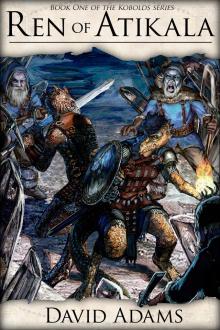 Ren of Atikala
Ren of Atikala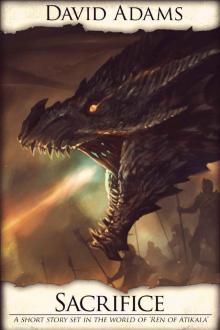 Sacrifice (Kobolds)
Sacrifice (Kobolds) Dusk
Dusk The Pariahs
The Pariahs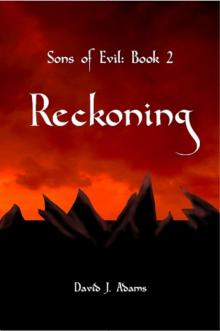 Reckoning
Reckoning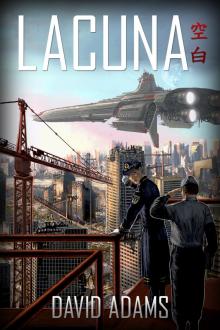 Lacuna
Lacuna Hammerfall
Hammerfall Evelyn's Locket
Evelyn's Locket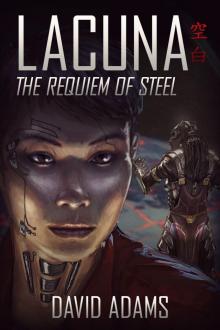 The Requiem of Steel
The Requiem of Steel Lacuna: Demons of the Void
Lacuna: Demons of the Void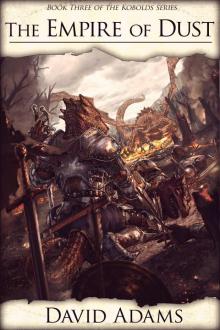 Ren of Atikala: The Empire of Dust
Ren of Atikala: The Empire of Dust The Soul Sphere: Book 02 - The Final Shard
The Soul Sphere: Book 02 - The Final Shard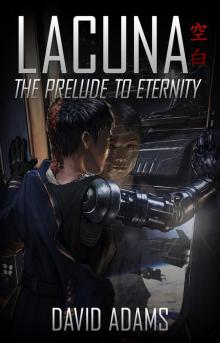 Lacuna: The Prelude to Eternity
Lacuna: The Prelude to Eternity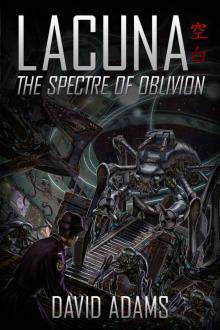 Lacuna: The Spectre of Oblivion
Lacuna: The Spectre of Oblivion Legacy Fleet: Hammerfall (Kindle Worlds) (Khorsky Book 1)
Legacy Fleet: Hammerfall (Kindle Worlds) (Khorsky Book 1) The Soul Sphere: Book 01 - The Shattered Sphere
The Soul Sphere: Book 01 - The Shattered Sphere Imperfect
Imperfect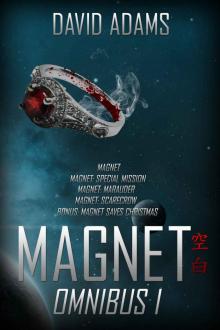 Magnet Omnibus I (Lacuna)
Magnet Omnibus I (Lacuna)